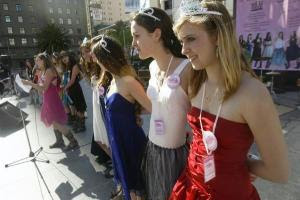
Douglas FischerMarin Independent Journal
Article Launched:04/25/2007 12:07:07 AM PDT
Article Launched:04/25/2007 12:07:07 AM PDT
SAN FRANCISCO - It's not every day that Jessica Assaf puts on a pink sequined prom dress with combat boots and gets herself kicked out of some of the finest shops in San Francisco. But when it happens, the San Rafael teen considers it a day well spent.
Assaf, a 17-year-old student at the Branson School, was among a group of about two dozen teens who raided Union Square in prom dresses Tuesday to protest the makeup of their makeup, urging regulators to follow Europe's lead and ban harmful chemicals from cosmetics.
The rally - part product launch, part political campaign, part health education - caps months of appearances by Teens for Safe Cosmetics at Bay Area stores, farmers markets and high schools to alert consumers, particularly teens, to potentially carcinogenic ingredients in beauty products and advocate for their banishment.
Chief among their complaints: The European Union has declared 1,100 ingredients unfit for cosmetics, while the United States has banned just nine.
"Teens should be able to look their best in prom without worrying about the body burden of all these chemicals," said Assaf, who was one of the first to join Teens for Safe Cosmetics in 2005 and won a Brower Youth Award last year for her leadership. "This is about standing up to a billion-dollar industry and demanding change. We should not have to chose between beauty and our health."
But it's also about health, said director Judi Shils. Talk to girls about eating right, and you can't get to them. But talk to them about their cosmetics, "and it's a magic door-opener."
"We hope it's a starting-off point. If people are mindful about what they put on their body, they'll be mindful about what they put in their body," Shils said. "It's been an amazing way to get kids to start thinking thoughtfully and mindfully."
At issue are carcinogens in cosmetics like coal tar, banned in Europe since 2004 but used here in shampoos to help dissolve scaly skin; solvents such as toluene to improve the gloss and adhesion of nail polish; plasticizers like phthalates to bind fragrances and prevent nail polish from chipping. There's also formaldehyde to disinfect creams and petrolatum to make lipstick shine. Both are banned in Europe.
All are used in tiny amounts. But the average American teen uses between 10 and 25 personal care products a day. Every day.
And over time, say those fighting for safer cosmetics, that can lead to a significant exposure - and potentially significant problems.
"We like using beauty products. We like looking good and smelling good," Sen. Carole Migden, a Democrat who represents Marin and San Francisco, said at the rally. "All we're saying is make them safe for us to use."
Migden last year wrote California's Safe Cosmetics Act, the toughest cosmetics law in the nation. It doesn't ban a thing.
Instead, it forces cosmetics manufacturers to file reports with the state on any carcinogens in their products. Release the data, the thinking goes, and the data will speak for itself.
Manufacturers note many of these compounds are used in trace amounts. Data on the health effects are either incomplete or inconclusive, they say. And the chemicals create consistent, affordable products accessible to a broad swath of the public.
The girls think they can do one better. And that was the final purpose of Tuesday's Union rally: A launch of "i" - a line of personal care products created by teens, for teens.
The first is a perfume, "i," formulated by girls in Teens for Safe Cosmetics and sold by EO, a small all-natural cosmetics company in Corte Madera.
EO co-founder Susan Griffin-Black set out 50 essential oils before the girls, gave them some basics about mixing scents and let them go.
"I just said go easy on the jasmine," an expensive oil, she said.
The result is sweeter than something she'd create, Griffin-Black said. But its reception among teens is universal.
One-third of an ounce of the perfume, made solely from essential oils, sells for $26 and will soon be available online or at Whole Foods.
The whole experience - lobbying in Sacramento for Migden's bill, creating the perfume, rallying in Union Square - has changed their lives, many girls said Tuesday.
"On so many eco-issues you don't really feel like you could affect change - like global warming," Assaf said. "This affects you at such a deep level É you could go home and immediately make a difference."
And it's not just kids.
Heidi Harris and Lana Karhu of Santa Rosa were strolling through Union Square on Tuesday evening when they stumbled upon the rally. They have two daughters, one 18, one 13. The younger daughter spent a weekend sleepover with three friends, applying makeup and having a blast.
Harris and Karhu left with a bunch of information and some samples.
"They're trying all these things on right now," Karhu said. "They're setting patterns that are going to fit for a life."

1 comment:
that's awesome!! =)
Post a Comment